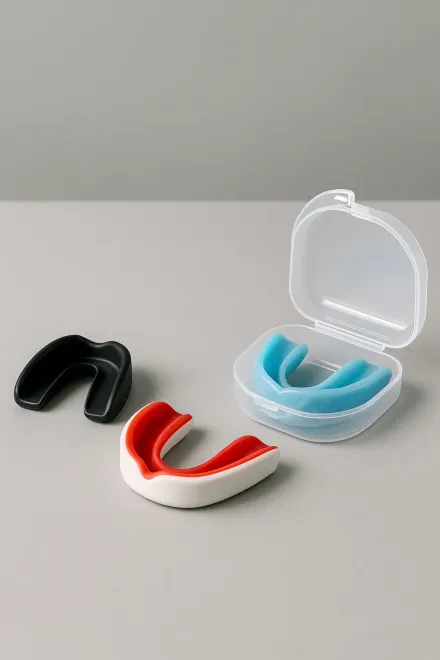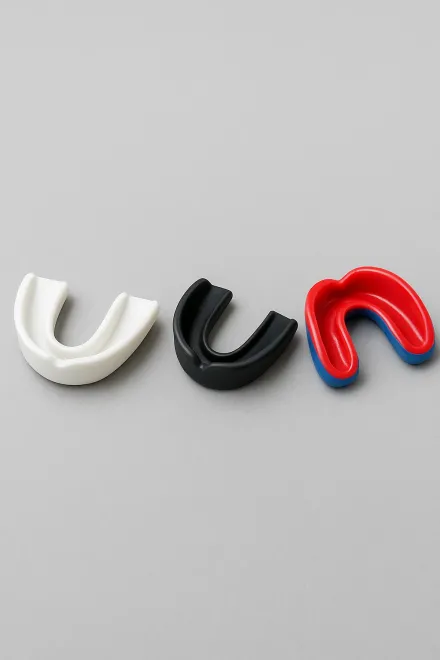Boxing mouthguards
Boxing mouthguards are one of the most important accessories for any practitioner, whether amateur or professional. Their main role is to protect teeth, gums, jaw and even reduce the impact of blows to the head. Choosing the right mouthguard not only makes a difference in comfort, but also in safety. Many injuries can be prevented by using a quality, properly fitted mouthguard. In this guide we will analyze the different types of mouthguards, their advantages, usage recommendations, and how to choose the most suitable model according to your experience level and needs.
See the best boxing mouthguards on Amazon
Why use a mouthguard in boxing?
Boxing is a high-contact sport where blows to the face are frequent. Mouthguards play a vital role: reducing the risk of dental fractures, cuts on lips and gums, and even temporomandibular joint issues. In addition, a good mouthguard can help decrease the force transmitted to the skull, contributing to lowering the risk of concussions.
Some of the main benefits of using a mouthguard in boxing are:
- Dental protection: Prevents fractures and displacement of teeth.
- Impact absorption: Reduces the energy reaching jaw and skull.
- Cut prevention: Minimizes injuries to lips and gums.
- Greater psychological security: The boxer trains and competes with more confidence.
In conclusion, a mouthguard is not an optional accessory, but an essential piece to practice boxing safely and responsibly.
Types of boxing mouthguards
Not all boxing mouthguards are the same. There are different models adapted to each boxer's level, budget, and training intensity. Below are the most common:
- Standard mouthguards: Ready to use, no adjustment needed. They are inexpensive, but usually less comfortable and secure as they do not fit the shape of the mouth.
- Boil & bite mouthguards: Softened in hot water and then bitten to take the shape of the teeth. They are the most popular for their price-quality ratio.
- Custom mouthguards: Made in dental clinics from a mold of the athlete's mouth. They offer maximum comfort, fit, and protection, but are more expensive.
The choice will depend on budget, practice frequency, and level of demand. A beginner may start with a boil & bite, while an advanced competitor should opt for a custom model.


Tips for choosing the ideal mouthguard
Choosing the right mouthguard is not always easy. There are several factors to consider to ensure it performs properly. Here are some practical recommendations:
- Fit: The mouthguard should stay firmly in place without having to clench your teeth constantly.
- Comfort: It is important that it does not cause nausea or make breathing difficult.
- Durability: Check that the material is resistant and does not wear down easily.
- Size: It should cover the upper teeth well (and in some cases, the lower), without being too bulky.
- Certifications: Some models come with safety standards approved by sports federations.
An additional tip is to try different brands and models until you find the one that best suits your anatomy and boxing style. Investing in a good mouthguard always translates into greater safety.
Care and maintenance of a boxing mouthguard
A mouthguard must not only be well chosen, but also properly cared for to extend its lifespan and avoid hygiene problems. Many boxers make the mistake of leaving it dirty or storing it in unsuitable places, which can cause bad odors, deformations, or bacterial buildup. To prevent this, follow these tips:
- Clean after each use: Wash the mouthguard with cold water and neutral soap. You can also use specific cleaning tablets.
- Use a ventilated case: Always store your mouthguard in a case with holes to avoid humidity and bacterial growth.
- Avoid heat exposure: Do not leave it in the car or near heat sources, as it can deform.
- Regular checkups: If you notice the mouthguard loses fit, has cracks, or is too soft, it's time to replace it.
- Do not share it: A mouthguard is a personal item. Sharing it increases the risk of infections.
A well-cared-for mouthguard can last months or even over a year, depending on use. However, for high-performance boxers, it is recommended to replace it more often due to constant wear.
Common mistakes when using boxing mouthguards
Although mouthguards are essential in boxing, many beginners and even some experienced athletes make mistakes that reduce their effectiveness. Here are the most common ones to avoid:
- Not using it in light training: Even in easy sessions, accidental blows can happen. Get used to wearing it always.
- Buying only by price: A very cheap mouthguard may be uncomfortable and unsafe. The cheapest option is not always the best.
- Not fitting it properly: If the mouthguard moves or falls out, it loses much of its effectiveness.
- Not replacing it on time: An old, cracked, or deformed mouthguard can even pose more risks than benefits.
- Neglecting hygiene: Storing it dirty encourages bacteria that can cause oral infections.
Avoiding these mistakes ensures that your mouthguard fulfills its role of protecting you in every training and fight.
Frequently asked questions about boxing mouthguards
What type of mouthguard is best for boxing beginners?
For beginners, boil & bite mouthguards are usually the best option. They are easy to adapt at home with hot water and provide a good level of protection at an affordable price. Standard mouthguards are too generic and may be uncomfortable, while custom ones, although best in fit and safety, are more expensive and not always necessary in the first training sessions.
How often should I change my boxing mouthguard?
Replacement frequency depends on use. If you train several times a week, it is best to change it every 6 months or so. However, if you notice that the mouthguard is cracked, deformed, soft, or no longer fits well, you must replace it immediately. A worn mouthguard loses effectiveness and may even increase the risk of injuries.
Can a mouthguard help prevent concussions?
Yes, although it does not completely eliminate the risk. A good mouthguard absorbs part of the impact that would otherwise be transmitted directly to the jaw and skull. This can reduce the force of the blows and therefore help lower the risk of concussions. However, it does not replace proper defensive technique or the use of other protective equipment such as headgear.
How should I clean my boxing mouthguard?
It is recommended to wash it with cold water and neutral soap after each use. You can also use soft brushes or effervescent dental cleaning tablets to keep it free of bacteria. Never wash it with hot water as it may deform. Also, always store it in a ventilated case to avoid moisture buildup.
Are double mouthguards better than single ones?
It depends on use and personal preference. Single mouthguards mainly protect the upper teeth and allow for easier breathing. Double mouthguards provide coverage for both upper and lower teeth, increasing protection, but sometimes make breathing harder. Many boxers prefer singles for comfort, although for high-impact fights, doubles may be more suitable.
Can a boxing mouthguard be used for other contact sports?
Yes, mouthguards are used in many contact sports such as kickboxing, MMA, muay thai, rugby, and even traditional martial arts. However, some sports may require specific designs. For example, in rugby comfort while speaking and breathing is prioritized, while in MMA maximum protection against blows and locks is key. Even so, a quality boxing mouthguard can adapt perfectly to other disciplines.
Can I mold a mouthguard more than once?
In most cases yes, especially with boil & bite mouthguards. If the fit is not perfect the first time, you can repeat the process of boiling and biting, although it is not recommended to do it too many times as the material may lose strength. Always follow the manufacturer's instructions to avoid damaging it.
